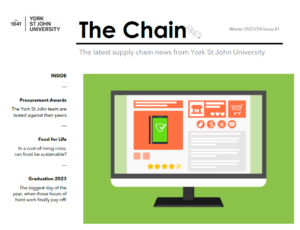The first issue of The Chain (Winter 2023/24 Issue #1) the quarterly YSJ supply chain and procurement newsletter is now available to download, via the link below.

The Chain magazine cover #1

The first issue of The Chain (Winter 2023/24 Issue #1) the quarterly YSJ supply chain and procurement newsletter is now available to download, via the link below.

The Chain magazine cover #1

The world in your hands
Commercial Corner S1E9 – The one where we go global
If you have any questions or comments, feel free to drop us an email at commercialcorner@outlook.com
—
Send in a voice message: https://podcasters.spotify.com/pod/show/adhocs/message

Commercial Corner Podcast
Commercial Corner S1E8 – The one where it’s time for tea
In this episode of Commercial Corner, Paul and Vicky talk about the Procurex conference and the GO Awards 2023. They also discuss CIPS exams and the value of meeting other buyers. If you have any questions or comments, feel free to drop us an email at commercialcorner@outlook.com
—
Send in a voice message: https://podcasters.spotify.com/pod/show/adhocs/message
The Importance of Sustainable Supply Chain Management

Yorkshire, in all its glory
There has been a growing focus on the importance of sustainable supply chain management, which may have been treated by some firms as a passing fad or a token gesture towards Corporate Social Responsibility (CSR). This is likely due to the increasing awareness of the environmental and social impacts of business, the rising demand for sustainable products and services from customers, and the increasing internal pressure on businesses to reduce their costs.
Sustainable supply chain management is the process of managing a supply chain in a way that minimizes its environmental and social impacts – whilst still achieving good value for money for stakeholders. There is no singular path to achieve this, and it can be done by using sustainably sourced materials, reducing waste, improving energy efficiency, as well as ensuring fair labour practices.
There are a number of benefits to implementing sustainable supply chain management. These include:
Higher education institutions play a role in promoting sustainable supply chain management by providing students with the knowledge and skills they need to work in this field. They can also do this by working with their own suppliers and business partners to develop sustainable supply chain management practices.
The British economy will benefit from this joined up approach in number of ways. These include:
Small and medium sized enterprises (SMEs) can play a huge role in this by developing new technologies that help them to reduce their environmental impact and improve their social impact. Due to their flatter and less hierarchical structures, they are often the first to respond to changes in the trading environment. They can also do this by working with larger businesses to implement sustainable supply chain management solutions.
There are opportunities for small innovative businesses to actively get involved in sustainable supply chain management. These can include:
By working together, higher education institutions, large established businesses, and small innovative businesses can help to drive forward looking supply chain management and ensure a thriving and sustainable future.

A small, local shop
Universities are the engine of the knowledge economy and the wider business community for many regions within the United Kingdom. In particular, university procurement teams are ideally placed to develop deep and strategic relationships with small businesses in order to support the local economy. Here are three reasons why:
1. Small businesses are often the lifeblood of local economies. They create jobs, generate tax revenue, and support other businesses in the community. By working with small businesses, university procurement teams can help to ensure that the local economy remains strong and vibrant.
2. Small businesses often have a strong commitment to quality and innovation. They are often more nimble and innovative than larger businesses, and they are often willing to take risks on new products and services. They have to move faster and be quicker to market, in order to outpace their larger and better resourced competitors. By working with small businesses, university procurement teams can help to acquire new and innovative products and services.
3. Small businesses often have a strong commitment to sustainability. They are often more aware of the environmental and social impact of their products and services, and they can be willing to make changes to their operations to reduce their environmental footprint. Smaller firms are less rigid in their ways of working. By partnering with small businesses, university procurement teams can help to reduce the overall environmental impact of the university’s operations.
There are a number of ways that university procurement teams can develop those relationships with small businesses. One way is to attend local small business events, such as trade shows and conferences. Another way is to network with small business owners online or through social media – they’re not afraid of going digital! Finally, university procurement teams can work with small business development centres in their community to identify and connect with small businesses – they may even be in a position to house these enterprise hub within their campuses.
Here are a few additional tips for university procurement teams that are looking to develop relationships with small businesses:
Be clear about your needs.
When you are talking to small businesses, be absolutely clear about what you are looking for. A well structured specification will help them to understand whether they can meet your needs and how they can work with you.
Be flexible.
Small businesses are often more flexible than larger businesses. They may be willing to work with you on pricing, delivery, or other terms – but similarly, if you can’t be flexible for them, then you can become a difficult customer to service.
Be patient.
It takes time to build relationships with small businesses. Don’t expect to have a successful relationship with local businesses overnight, now can every need be satisfied. Be patient and persistent, and you will eventually see results.

Commercial Corner Podcast
Commercial Corner S1E5 – The one where we meet Martin Lewis
In this episode of Commercial Corner Paul and Vicky talk to Martin Lewis from Graduation Attire, about sustainable robes, tenders, Nu-Metal and Pokémon. If you have any questions or comments, feel free to drop us an email at commercialcorner@outlook.com.

Small steps leave greener footprints.
There is a drive in procurement circles to be able to demonstrate that the work we do is sustainable. This can sometimes be a blunt tool used to deliver a precise job, but it does raise the question – why isn’t all procurement sustainable anyway? The opposite would be unsustainable procurement and surely nobody sets out at the start of a project or a contract with the intention that it will run out of steam part way through. If a contract cannot be sustained over its lifetime, or it needs other activity to artificially prop it up, then it isn’t sustainable, it will incur undue additional costs and likely collapse before its intended completion.
McKinsey and EuroCommerce recently looked at the potential to limit carbon emissions in the retail sector (https://www.eurocommerce.eu/transforming-retail-wholesale) and felt that a 90% reduction was possible. However, it required something in the region of €300 of investment to get there. Higher Education providers in the UK probably have similar sized challenge, especially as they oversee much older estates than the retail sector and are also heavily exposed to energy price fluctuation. All those big lecture halls and libraries need heating now we’re out of the pandemic and students are back on campus. Chasing consensus on clever contract clauses that will hold suppliers accountable for their social and environmental responsibilities will help, but only for those accounts that procurement teams are involved in negotiating.
Procurement teams may not be responsible for every purchase made in their institutions, loath as they may be to admit it. Matters of non-compliance and rogue spending aside, not every contract will fall under their scope for influenceable spend. It is uncommon for procurement procedures to be mandated, even where they are strongly recommended. Having a semi-centralised hybrid model with elements of devolved authority is more typical. This makes it all the more vital for procurement professionals to have excellent soft skills – the abilities to persuade, win buy-in, to encourage and to empathise with the needs of stakeholders. Where they can’t change behaviours with edicts from up on high, they will be called upon to engage with their colleagues and help them to see the world through their eyes.
It’s not unheard of for a cost centre manager or a budget holder to be laser focused on their in-year savings, as their personal objectives will be probably based on achieving those. Indeed, procurement can be encouraged to chase those ‘smash and grab’ style deals, with unachievable targets and little thought given to how a contract can be sustained for its duration. With the current economy being in a downturn, this sort of scenario is likely to become more commonplace as procurement is called up to the plate to lower costs and reduce the overall exposure to future costs.
If procurement teams are pressured to pursue in-year or short-term savings, it could risk the longer term commercial sustainability of contracts if suppliers are unduly pressured to cut costs and trim corners. In addition, as part of this general belt-tightening, the wider environmental and social sustainability of contracts ends up being reclassified as ‘nice to haves’ or value-add features. If they are not seen as fundamental elements of core delivery, then these might well end up being the first casualties. If the economy slows down further, then procurement teams may be the people being asked to use their soft skills again to encourage their organisations to see the long term value of non-cost benefits that contribute to the wider social and environmental impact of their supplier contracts.

So many possibilities….
On the 9th January 2023 the second reading of the Procurement Bill in the House of Commons took place. Set to come into force Spring this year, it is intended to improve and simplify the way public procurement is undertaken in the UK, with a keen focus on value for money, transparency and creating better opportunities for SMEs.
York St John University understands the value of working with SMEs and so the purpose of this blog is to advise SMEs of how to submit tenders, where, and provide a bit of background about York St John University and the type of procurement we do.
Our income is from our students (around 9000 at last count) and the majority of that is spent on the resources around delivering the courses such as academic fees, buildings, utilities, but it is so much more. In the last 2 years we have brought our catering in house and tendered for an open day shell scheme, sports kit for staff and students, external and internal audit services, apprenticeship support services, an Economic and Social Impact Assessment, project management course support, marketing agency services, a campus medical practice, pitch light installation and maintenance, heating, ventilation and air conditioning, to name but a few. Most of our procurement work has been for the York Campus, but we also support our London Campus.
Our opportunities are posted on the North Eastern Universities Purchasing Consortium’s (NEUPC) Delta Platform, but are also on the Governments Contract Finder. For a supplier they will need to go to https://neupc.delta-esourcing.com/ and register. The portal is a joint project between the universities of Bradford, Bishop Grosseteste, Huddersfield, Leeds, Leeds Arts, Leeds Beckett, Leeds Trinity, Lincoln, Northumbria, Teeside, York St John, along with the Royal Armouries. Registering on the portal does not mean you are an approved supplier, but it will give suppliers access to tenders which they can then choose whether or not to bid on.
Once on Delta, suppliers can review the tender opportunities, review documents and when ready, bid. We ensure all our Invitation to Tender documents are created in as simple a format as possible, provide the required information as to what we are looking to procure, detailed specifications, information on how we want the the bid to be responded to and the weighting and scoring we will use for all the bids. We also need suppliers to complete a questionnaire within Delta which asks for general company, financial and legal information. If you have any queries on the tender you can submit them via the Delta messaging service and we will create a Q&A so all suppliers have access to the same data. Once you have submitted your tender, and the deadline has passed Delta releases all bids so we can open and start our evaluation process.
So there you have it, how to do business with York St John University. The key actions I would suggest to any buyer wanting to work with York St John University are to: –
Happy bidding!

Commercial Corner Podcast
Commercial Corner S1E3 – The one where we talk about finance
In this episode of Commercial Corner, Paul and Vicky talk about procurement policies, vending machines and are joined by their super, special guest David Howell from York St John University, to get some insight into the world of finance.